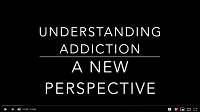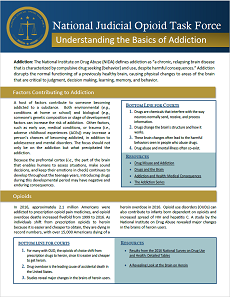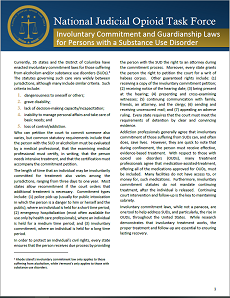Understanding Addiction: A New Perspective (12/2018, NJOTF): Informative explanation of the physiology of addiction.
Understanding the Basics of Addiction (10/2018, NJOTF): Provides the basics of addiction including contributing factors, treatment, and innovative court programs being used to combat the opioid crisis.
Involuntary Commitment and Guardianship Laws for Persons with a Substance Use Disorder (10/2018, NJOTF): Provides a list of states that have enacted involuntary commitment and guardianship laws for those suffering from alcoholism and/or substance use disorders (SUDs).
Substance Use Disorder (Johns Hopkins University’s Bloomberg School of Public Health)
Action Collaborative on Countering the U.S. Opioid Epidemic (National Academy of Medicine)
National Opioids Crisis: Help and Resources (U.S. Department of Health and Human Services)
Drug Facts (National Institute on Drug Abuse): Useful landing page that has links to basic facts and effects of various drugs, addiction, recovery, and prevention.
Drugs and the Brain (National Institute on Drug Abuse): Good primer on addiction and the brain.
Drug Misuse and Addiction (National Institute on Drug Abuse)
Key Substance Use and Mental Health Indicators in the United States: Results from the 2021 National Survey on Drug Use and Health (2021, Substance Abuse and Mental Health Services Administration-SAMHSA)
Common Comorbidities with Substance Use Disorders ( National Institute on Drug Abuse): Provides information on the state of the science in the comorbidity of substance use disorders with mental illness and physical health conditions.
Animated video series from Addiction Policy Forum on Addiction (Addiction Policy Forum): Educational animated series to expand public understanding about addiction and SUDs.
Addiction Science (National Institute on Drug Abuse): Excellent resource to educate coworkers, system partners, and stakeholders.
In Brief: Chronic Substance Use and Cognitive Effects on the Brain: An Introduction (Substance Abuse and Mental Health Services Administration-SAMHSA): Excellent resource for anyone who works with this population. Explains addiction in understandable language and provides some strategies to employ.
TEDx: Addiction is a Disease. We Should Treat it Like One (Michael Botticelli, TEDxMidAtlantic)
Why We Should Say Someone is a ‘Person with an Addiction,’ Not an Addict (6/11/2017, National Public Radio)
Language Matters in the Recovery Movement (Faces and Voices of Recovery, Addiction Technology Transfer Center Network, Phoenix Center)
The Rhetoric of Recovery Advocacy: An Essay on the Power of Language (White, William L.)
How to Be Human: Talking to People with Addiction or Substance Use Disorders (Healthline)
Economic Opportunity and the Opioid Crisis: Geographic and Economic Trends (6/2018, Office of The Assistant Secretary for Planning and Evaluation)


